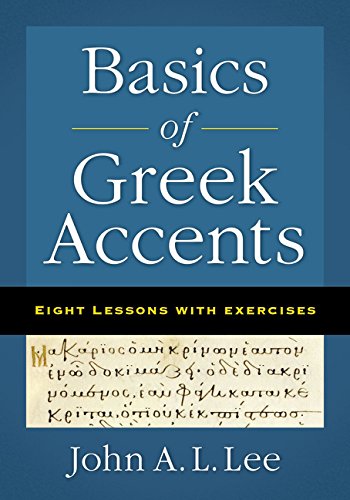A Brief Book Notice from Books At a Glance
Fred Zaspel
Herbert Youtie warns Greek students, “Make sure of your accents at all times. Nothing so quickly repels a Greek scholar as false accents.” Well, you may not feel that repulsion yourself, and in fact you may not even notice false accents! But you will understand John Lee’s reminder that “True competence in Greek cannot be attained without competence in Greek Accents.”
If that reminder points up a weak spot in your understanding of Greek, then this little book is written for you. In his Introduction John Lee describes his goal:
The aim of this book is strictly practical: to teach the basics of Greek accentuation to anyone who has already learnt some Greek but who, for whatever reason, has an unsure grasp of Greek accents or no grasp at all. It does not attempt to cover every detail. The beginner cannot cope with an exhaustive treatment, and there are good reference books that can be consulted once the basics are known. Exercises are included, for use both in class and at home. Building confidence is an important part of what is needed. Theory is not discussed.
With these parameters in place, Lee covers all the bases in under sixty pages – instruction and exercises all:
1. The Basic Rules
2. Verbs
3. Nouns and Adjectives
4. Good Words to Know
5. More about Nouns and Adjectives
6. Contraction
7. Enclitics
8. Scaling the Heights
It’s an excellent review course from a proven authority. A very helpful, easily accessible, effective tool for gaining competence in this often-neglected area of Greek study.
Endorsements
Constantine R. Campbell:
There is simply no better place to start learning Greek accentuation than right here with this book.
James K. Aitken:
With admiral clarity and simplicity John Lee introduces the rules of Greek accentuation in eight short lessons. Accents are rarely taught, though central to advanced Greek study; and no other resource makes learning accents easier and explains their complexities in a more accessible fashion. Every serious student should study this book.
Daniel Wallace:
Greek accents are a seemingly impenetrable haze to most students of the New Testament. John Lee’s Basics of Greek Accents cuts through the fog in a pedagogically humane way. Well laid out and easy to digest, this book offers a straightforward, step-by-step approach to the acquisition of Greek accentuation for any who want to master this language. I recommend it even for the beginner because knowledge of the accents is essential for learning the language properly from the get-go. It is much easier to have good habits of pronunciation from the start than to unlearn bad habits later on
Robert L. Plummer:
In G. K. Chesterton’s autobiography, he writes, ‘As for Greek accents, I triumphantly succeeded, through a long series of school-terms, in avoiding learning them at all.’ If many a Greek teacher is honest, his or her knowledge of Greek accents may not be too far behind Chesterton’s. Thankfully, in this compact and well-written new book, John Lee guides both professors and students to a competency in Greek accents. Thanks are due to Dr. Lee for producing a resource that has been needed for generations.
Andreas J. Köstenberger:
From the author of the magisterial History of New Testament Lexicography, here comes an eminently useful and practical tool on Greek accents—for students, teachers, and editors alike. Highly recommended!
T.V. Evans:
John A.L. Lee is both a distinguished authority on ancient Greek and an outstanding classroom teacher. This compact book, beautifully produced, dispels the unnecessary mystique that has come to shroud the topic of ancient Greek accents, offering a clear and practical approach to rapid mastery of the basic rules and patterns of usage. The book is best suited to use in the classroom context, but it can also be used effectively for private study. It functions as a highly accessible guide for those taking their first steps in Greek accentuation, while experts too will find valuable insights here. I strongly recommend it to all teachers of the language.
Eleanor Dickey:
A really useful little book!
